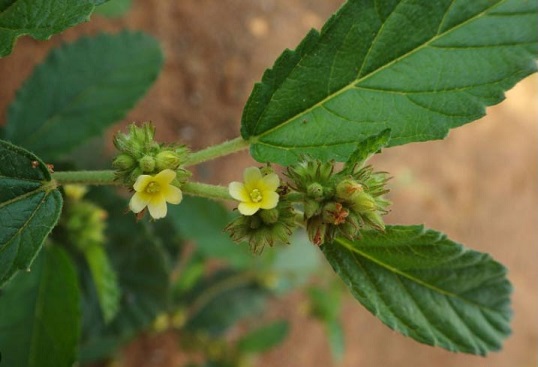Nikhil Prasad Fact checked by:Thailand Medical News Team Jul 17, 2024 8 months, 2 weeks, 13 hours, 57 minutes ago
Herbs And Phytochemicals: Researchers from various prestigious institutions have discovered promising plant-derived compounds that may serve as dual inhibitors of SARS-CoV-2 main protease and spike glycoprotein. This
Herbs And Phytochemicals news report delves into the fascinating world of antiviral alkaloids and their potential in combating COVID-19.
 Plant Alkaloids Show Promise Against COVID-19
Image: Waltheria indica L. [Malvaceae]
Unveiling the Power of Alkaloids
Plant Alkaloids Show Promise Against COVID-19
Image: Waltheria indica L. [Malvaceae]
Unveiling the Power of Alkaloids
The study, conducted by researchers from Bahauddin Zakariya University, National University of Medical Sciences, Kohat University of Science & Technology (All three in Pakistan), Federal University of Ceara-Brazil, Massachusetts General Hospital-USA, Harvard Medical School-USA, King Saud University-Saudi Arabia, and Southwest Medical University-China, identified 12 alkaloids from 12 medicinal plants. These alkaloids showed potential as dual inhibitors of the SARS-CoV-2 main protease and spike glycoprotein.
The Method Behind the Discovery
Computational Screening
The research team utilized computational screening to analyze 404 alkaloids from medicinal plants known for their antiviral properties. They focused on the main protease and spike glycoprotein of SARS-CoV-2, which are crucial for the virus's replication and entry into host cells. The screening process involved evaluating docking scores, drug-likeness, bioactivity scores, and stability through molecular dynamic simulations.
Key Findings
Out of the 404 alkaloids, 12 exhibited strong dual inhibitory potential. These alkaloids are adouetine Y, evodiamide C, ergosine, hayatinine, (+)-homoaromoline, isatithioetherin C, N,alpha-L-rhamnopyranosyl vincosamide, pelosine, reserpine, toddalidimerine, toddayanis, and zanthocadinanine.
Detailed Look at Top Alkaloids
-Adouetine Y
Adouetine Y, isolated from Waltheria indica L. [Malvaceae], showed high binding affinity with both the main protease and spike glycoprotein. It forms hydrogen bonds with key residues, making it a strong candidate for further research. Waltheria indica L. is known for its various pharmacologic activities, including anti-cataract, anti-cancer, and antiviral properties.
-Ergosine
Ergosine, an ergot alkaloid from Rhizophora apiculata Blume [Rhizophoraceae], demonstrated excellent binding interactions and stability. This alkaloid showed promising pharmacokinetic properties, including good absorption and bioavailability. Rhizophora apiculata Blume is known for its antioxidant, antinociceptive, and anti-cancer activities.
-Evodiamide C
Evodiamide C, found in Evodia rutaecarpa (Juss.) Benth. [Rutaceae], exhibited strong inhibitory effects on bot
h target proteins. This alkaloid is part of traditional Chinese medicine and has various biological activities, including anti-inflammatory, anti-cancer, and antiviral properties.
-Reserpine
Source: Cissampelos pareira L. [Menispermaceae]
Mechanism: Forms stable interactions with main protease and spike glycoprotein.
Benefits: Has anti-cancer, anti-inflammatory, and antibacterial activities.
-Pelosine
Source: Cissampelos pareira L. [Menispermaceae]
Mechanism: Strong hydrophobic interactions with viral proteins.
Benefits: Known for anti-inflammatory and anti-malarial properties.
-Hayatinine
Source: Cissampelos pareira L. [Menispermaceae]
Mechanism: Effective binding with both target proteins.
Benefits: Possesses anti-plasmodial and chemopreventive activities.
-Homoaromoline
Source: Cissampelos pareira L. [Menispermaceae]
Mechanism: Interacts with significant residues in viral proteins.
Benefits: Has cytotoxic effects on cancer cells and antiviral properties against HSV-1 and HSV-2.
-Isatithioetherin C
Source: Isatis indigotica Fort. [Brassicaceae]
Mechanism: Forms multiple hydrogen bonds with viral proteins.
Benefits: Exhibits broad-spectrum antiviral activity against various viruses.
-N,alpha-L-rhamnopyranosyl vincosamide
Source: Moringa oleifera Lam. [Moringaceae]
Mechanism: Interacts with key residues in the main protease and spike glycoprotein.
Benefits: Known for its antioxidant, anti-inflammatory, and cardioprotective effects.
-Toddalidimerine
Source: Toddalia asiatica (L.) Lam. [Rutaceae]
Mechanism: Strong binding with spike glycoprotein, inhibiting viral entry.
Benefits: Exhibits anti-cancer, antimicrobial, and wound-healing properties.
-Toddayanis
Source: Toddalia asiatica (L.) Lam. [Rutaceae]
Mechanism: Forms stable interactions with viral proteins.
Benefits: Known for its anti-inflammatory, antioxidant, and anti-malarial activities.
-Zanthocadinanine
Source: Toddalia asiatica (L.) Lam. [Rutaceae]
Mechanism: Interacts with main protease and spike glycoprotein.
Benefits: Possesses antimicrobial, anti-inflammatory, and anti-cancer properties.
Detailed Analysis of Alkaloid Mechanisms
The study provides a detailed analysis of how these alkaloids interact with SARS-CoV-2 proteins. For instance, adouetine Y and evodiamide C showed exceptional binding stability and interactions with multiple residues in the main protease and spike glycoprotein. This dual inhibition approach is crucial as it targets both viral replication and entry, reducing the chances of viral escape through mutations.
The Importance of Plant-Derived Compounds
Plant-derived compounds have been used in traditional medicine for centuries due to their therapeutic properties and lower toxicity compared to synthetic drugs. The discovery of these alkaloids reinforces the potential of natural products in modern drug development, especially in the fight against emerging infectious diseases like COVID-19.
Future Directions and Conclusion
While the study's findings are promising, it is essential to conduct further in vitro and in vivo studies to confirm the efficacy and safety of these alkaloids as COVID-19 treatments. The computational approach used in this research has significantly reduced the time and cost associated with drug discovery, providing a valuable framework for future studies.
The study findings were published in the peer-reviewed journal: Frontiers in Pharmacology.
https://www.frontiersin.org/journals/pharmacology/articles/10.3389/fphar.2024.1369659/full
For the latest on
Herbs and Phytochemicals, keep on logging to Thailand Medical News.
Read Also:
https://www.thailandmedical.news/news/terpenes-from-plants-belonging-to-the-fabaceae-family-show-potential-to-treat-covid-19
https://www.thailandmedical.news/news/herbs-and-phytochemicals-south-african-plants-could-help-fight-covid-19-
